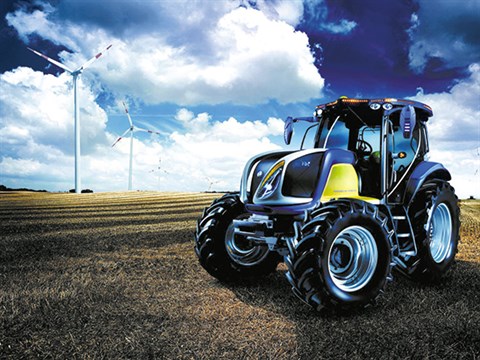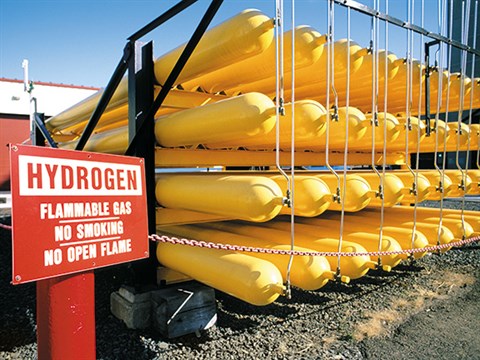Hydrogen fuel cells: the future of farming?
Can science and technology ever hope to rid commercial agriculture of its fossil-fuel habit? Steve Kealy investigates.

Futurists would have us believe that self-driving, self-aware robotic machines will soon be running farms, stopping only to refuel themselves from entirely renewable fuel sources. Farmers will direct operations from hundreds, or even thousands, of kilometres away.
Wishful thinking? Maybe not...
Hydrogen-fuelled tractors
A key part of New Holland's Energy Independent Farm project is a tractor that runs on hydrogen. The project aims to eliminate the use — and therefore the cost — of fossil fuel from the agricultural production cycle.
Based on a T6000 model, the experimental NH2 tractor was first seen in 2009 and replaces the normal diesel engine with hydrogen fuel cells to generate electricity, driving motors which power the tractor. The tractor is a 100-kilowatt working prototype able to perform all the tasks of a regular T6000, but needing no fossil fuels, and emitting only water and steam.
Experimental hydrogen-powered vehicles fall into two distinct types: those using hydrogen as a fuel in a modified internal combustion engine and those using hydrogen to generate electricity for powering electric motors.
Hydrogen is hard to store as a liquid fuel. It needs to be chilled to around -252C and compressed, but even liquid hydrogen isn't a great source of power, producing about 10 megajoules (MJ) per litre, against petrol at 33MJ and diesel at about 37MJ. It’s more efficient by weight, however.
The experimental NH2 is the first tractor in the world to be powered by hydrogen and replaces the normal diesel combustion engine with hydrogen fuel cells and electric motors. Compressed hydrogen from the tractor's tank reacts with oxygen in the fuel cell to generate electrical power.
The fuel cell generates less heat than an engine, offers a consistent output of power and doesn't produce polluting nitrogen oxides, soot particulates or carbon dioxide. Electric motors have fewer moving parts, no need of cooling or external lubrication systems, require no gearboxes and are smaller than engines.
The electrical drive has several bonuses for farming applications, too: the NH2 is nearly silent — about 55dBA — delivers maximum torque immediately, needs no transmission or even a shuttle, can go from forward to reverse instantly, offers variable power take-off (PTO) speeds from 0rpm to 1,000rpm and is extremely economical — no fuel is wasted when the vehicle would otherwise be idling.
Pros and cons
Hydrogen is the most abundant element in the universe, but is always bonded with something else like oxygen (to make water) or carbon (in plants). It's also the major component of the sun.
To make use of hydrogen, it must be separated so it can be used as an energy carrier. It can be made from water, plants, coal, natural gas — even algae.
The energy to produce hydrogen can come from any renewable resources such as waste, biomass, wind or solar panels; with present technology, 600m2 of photovoltaic panels are needed to generate enough energy for the NH2.

Fuel cell vehicles have a number of advantages over straight battery-driven electric vehicles. They have a long working life and avoid the environmental issues of disposing of exhausted batteries, which gradually lose capacity during their life.
Battery driven electric vehicles are usually heavier, most efficient in stop-start applications and take a long time to recharge.
Agricultural vehicles usually run at near-constant speeds for lengthy periods, making them good candidates for fuel cell applications.
Besides safety — remember the hydrogen-filled Hindenburg airship that exploded in flames in New York in 1937 — barriers to the use of hydrogen as a fuel involve its distribution and widespread and convenient availability.
Just add water
New Holland's Energy Independent Farm concept produces compressed hydrogen from water using electrolysis, or from methane generated by waste or biomass, or powered by wind farms and solar panels.
"Farmers are in a unique position to benefit from hydrogen technology," New Holland Head of Global Product Marketing, Tractors & Telehandlers Pierre Lahutte says.
"Unlike many people, they have the space to install alternative electricity generation systems, such as solar, wind, biomass or waste, and then store that power as hydrogen.
"Apart from the environmental benefits, such a system would allow customers to become energy independent and improve their financial stability," Lahutte says.
Contrary to expectations, electrolysis doesn't require large amounts of water. The hydrogen extracted from a litre of water using a hydrogen generator could drive a hydrogen fuel cell vehicle just as far as petrol-powered vehicles travel today on a litre of petrol.
This prompts the obvious question about water versus fuel: if all cars ran on hydrogen, and all hydrogen was produced from water, would we run out of water?
A simple examination suggests converting the entire current United States car fleet to run on hydrogen would require about 300 billion litres of water per year to create the needed hydrogen.
Yet about 900 billion litres of water per year is used to make the petrol those cars use now, so hydrogen-power would use just a third as much — a significant water saving. Plus the exhaust of hydrogen-powered vehicles is simply steam and condensed water droplets, not toxic gasses.
The future of farming
Various electricity production systems are already in use on many farms around the world, harnessing wind, sun and biomass. However, electricity not used immediately is sold back to the national grid, or lost. The Independent Farm Concept stores surplus power as compressed hydrogen, available for use in farm machinery or generators to power and heat buildings.
Since 2010, a working experimental farm, La Bellotta, on the outskirts of Turin in Italy has been making its own fuel; it's equipped with a hydrogen storage tank, a "filling station" complete with liquid hydrogen compressor and this is where the NH2 lives and works.
Finally, scientifically-astute readers will recognise NH2 as Amidogen, a building block of DNA and therefore, all life on earth...
For the latest news and reviews of farm machinery, subscribe to Farm Trader magazine here.
Keep up to date in the industry by signing up to Farm Trader's free newsletter or liking us on Facebook



.jpg)



.jpg)
.jpg)
.jpg)

